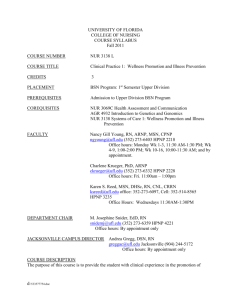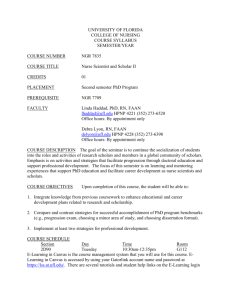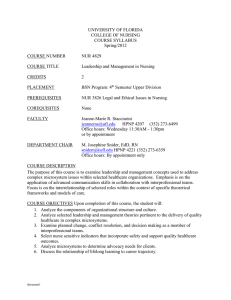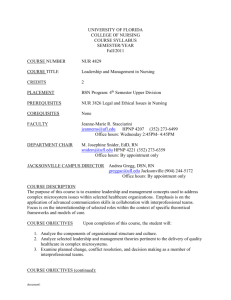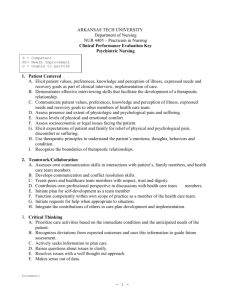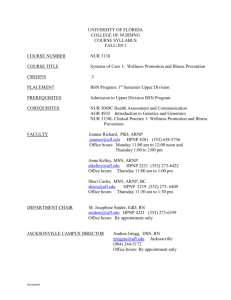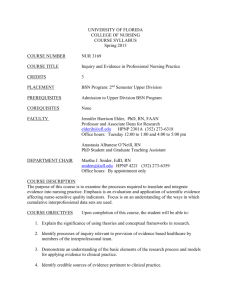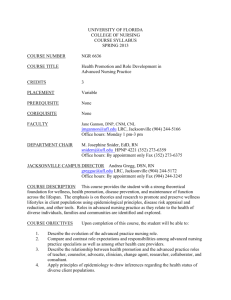Syllabus - College of Nursing
advertisement
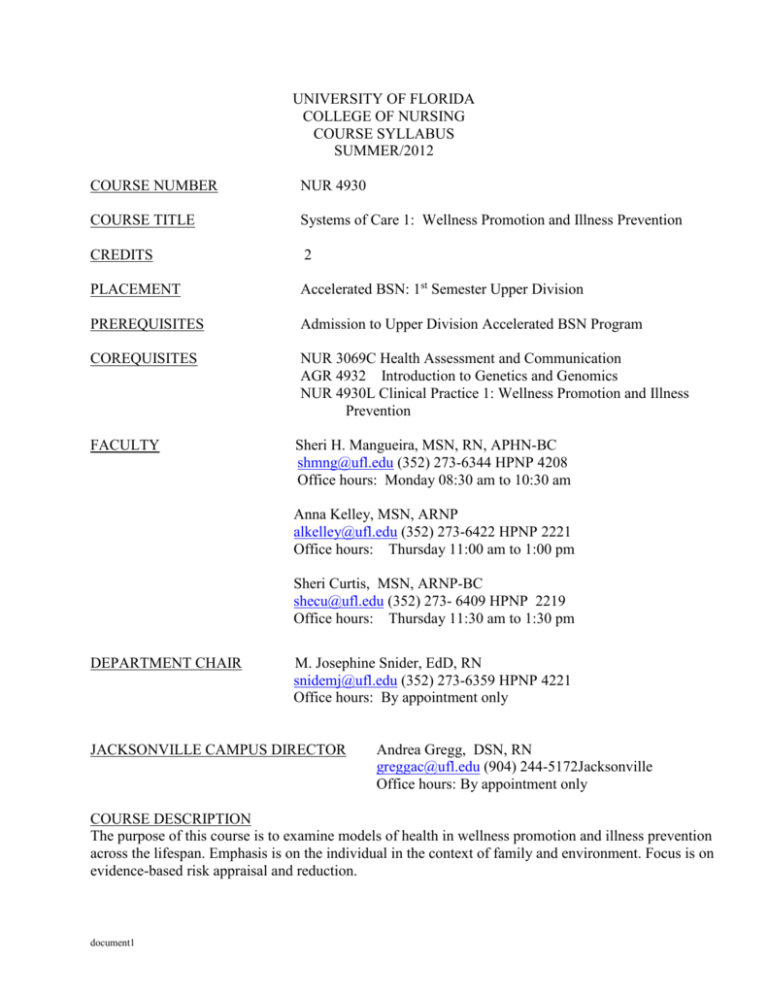
UNIVERSITY OF FLORIDA COLLEGE OF NURSING COURSE SYLLABUS SUMMER/2012 COURSE NUMBER NUR 4930 COURSE TITLE Systems of Care 1: Wellness Promotion and Illness Prevention CREDITS 2 PLACEMENT Accelerated BSN: 1st Semester Upper Division PREREQUISITES Admission to Upper Division Accelerated BSN Program COREQUISITES NUR 3069C Health Assessment and Communication AGR 4932 Introduction to Genetics and Genomics NUR 4930L Clinical Practice 1: Wellness Promotion and Illness Prevention FACULTY Sheri H. Mangueira, MSN, RN, APHN-BC shmng@ufl.edu (352) 273-6344 HPNP 4208 Office hours: Monday 08:30 am to 10:30 am Anna Kelley, MSN, ARNP alkelley@ufl.edu (352) 273-6422 HPNP 2221 Office hours: Thursday 11:00 am to 1:00 pm Sheri Curtis, MSN, ARNP-BC shecu@ufl.edu (352) 273- 6409 HPNP 2219 Office hours: Thursday 11:30 am to 1:30 pm DEPARTMENT CHAIR M. Josephine Snider, EdD, RN snidemj@ufl.edu (352) 273-6359 HPNP 4221 Office hours: By appointment only JACKSONVILLE CAMPUS DIRECTOR Andrea Gregg, DSN, RN greggac@ufl.edu (904) 244-5172Jacksonville Office hours: By appointment only COURSE DESCRIPTION The purpose of this course is to examine models of health in wellness promotion and illness prevention across the lifespan. Emphasis is on the individual in the context of family and environment. Focus is on evidence-based risk appraisal and reduction. document1 COURSE OBJECTIVES Upon completion of this course, the student will be able to: 1. Integrate beginning concepts of wellness promotion and disease, injury, and disability prevention with individuals across the lifespan in a variety of settings. 2. Describe primary, secondary, and tertiary prevention strategies used in a variety of healthcare settings. 3. Identify environmental factors that influence the healthcare needs and preferences of individuals as members of families. 4. Compare and contrast methodologies used in health teaching and health counseling. 5. Discuss from a nursing perspective contributions to the work of interprofessional healthcare teams in facilitation of positive healthcare outcomes for clients. COURSE SCHEDULE Section 71BH Day Monday Time 2:00 to 4:55pm Room HPNP G-103 E-Learning (Sakai) is the course management system that you will use for this course. E-Learning is accessed by using your Gatorlink account name and password at http://lss.at.ufl.edu. There are several tutorials and student help links on the E-Learning login site. If you have technical questions call the UF Computer Help Desk at 352-392-HELP or send email to helpdesk@ufl.edu. It is important that you regularly check your Gatorlink account email for College and University wide information and the course E-Learning site for announcements and notifications. Course websites are generally made available on the Friday before the first day of classes. ATTENDANCE Students are expected to be present for all scheduled classes, other learning experiences, and examinations. Students who have extraordinary circumstances preventing attendance should explain these circumstances to the course instructor prior to the scheduled class or as soon as possible thereafter. Instructors will then make an effort to accommodate reasonable requests. A grade penalty may be assigned for late assignments, including tests. There will be no make-ups for missed quizzes. Make-up exams will be given only under extenuating circumstances that could not have been predicted ahead of time and the format will be essay questions. document1 ACCOMMODATIONS DUE TO DISABILITY Each semester, students are responsible for requesting a memorandum from the Disability Resource Center to notify faculty of their requested individual accommodations. This should be done at the start of the semester. STUDENT HANDBOOK Students are to refer to the College of Nursing Student Handbook for information about College of Nursing policies, honor code, and professional behavior. TOPICAL OUTLINE 1. 2. 3. 4. 5. 6. 7. Concepts of wellness promotion and illness prevention across the lifespan and settings a. Healthy People initiatives b. Models of health c. Incidence and prevalence d. Primary, secondary, and tertiary prevention e. US Preventive Task Force recommendations Effective health education strategies in a variety of practice settings a. Individual safety b. Occupational/environmental safety c. Wellness education d. Health literacy, technology, and information management Individual and family wellness promotion and illness prevention a. Normal pregnancy and fetal care b. Postpartum care c. Newborn care and feeding d. Childhood (e.g. prevention of accidents, immunizations, obesity) e. Adulthood (e. g. menopause, monitoring, lifestyle modification) f. Older adult care Risk appraisal, risk reduction and vulnerability Environmental assessment Nursing and inter-professional interventions for individuals in the context of family Evaluation of interventions TEACHING METHODS Lecture, discussion, quizzes, and in class activities LEARNING ACTIVITIES Class participation, written assignments and examinations, quizzes, and reading assignments EVALUATION METHODS/COURSE GRADE CALCULATION Quizzes 20% (random dates - drop lowest quiz score - no make-up allowed) Test 1 40% (07/02/12) Test 2 40% (08/06/12) 100% document1 Feedback on all graded assignments routinely is given within five [5] working days of the due date. For scores lower than 74% on Test #1 or Test #2, review available by appointment only. GRADING SCALE/QUALITY POINTS A AB+ B BC+ 95-100 (4.0) C 74-79* (2.0) 93-94 (3.67) C72-73 (1.67) 91- 92 (3.33) D+ 70-71 (1.33) 84-90 (3.0) D 64-69 (1.0) 82-83 (2.67) D62-63 (0.67) 80-81 (2.33) E 61 or below (0.0) * 74 is the minimal passing grade REQUIRED TEXTS Berman, A. & Snyder, S. (2012). Kozier & Erb’s Fundamentals of Nursing: Concepts, process, and practice (9th ed.). Boston: Pearson. Perry, S.E., Hockenberry, M.J., Lowdermilk, D.L., & Wilson, D. (2010). Maternal child nursing care (4th ed.). Maryland heights, MO: Mosby Elsevier document1 WEEK 1 DATE 5/14 TOPIC Introduction and Overview of Course Mangueira, Castleman, Kelly, Curtis Historical and Contemporary Nursing Practice Evidence-Based Practice and Research in Nursing Nursing Theories and Conceptual Frameworks Health Care Delivery Systems Community Nursing and Care Continuity 2 5/21 Home Care Electronic Health Records and Information Technology Critical Thinking and Nursing Practice with Concept Mapping 3 4 5/28 6/04 The Nursing Problem Memorial Day – Holiday Health Promotion 5 6/11 Health, Wellness, and Illness Culturally Responsive Nursing Care Complementary and Alternative Healing Modalities Concepts of Growth and Development Caring Communicating Teaching 6 6/18 Wellness Education Safety Self-Concept Sexuality Spirituality Stress and Coping document1 7 8 6/25 7/2 9 10 11 12 7/9 7/15 7/23 7/30 Loss, Grieving, and Death Summer Break Exam – 1 ----Promoting Health From Conception –Part I (1 hour) Promoting Health from Conception – Part II (3 hours) Promoting Health from Birth through Adolescence (3 hours) Promoting Health in Young and Middle-Aged Adults Promoting Health in Older Adults 8/6 Promoting Family Health Exam – 2 13 document1
